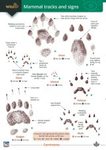Flora / Fauna
By: Klaus Hackländer(Editor), Frank E Zachos(Editor)
117 pages, 5 colour photos and illustrations, 11 b/w illustrations, tables
![Mammals of Europe Mammals of Europe]()
Click to have a closer look
About this book
Customer reviews
Biography
Related titles
About this book
This introductory volume provides an overview about the history and current status of European mammals, as well as management strategies. The remaining volumes cover comprehensive overviews of each species' biology including paleontology, physiology, genetics, reproduction and development, ecology, habitat, diet, mortality and age determination. Their economic significance and management, as well as future challenges for research and management are also addressed. Each chapter includes a distribution map, a photograph of the animal and key literature. This authoritative handbook provides a timely and detailed description of all European mammals and will appeal to academics and students in mammal research, as well as to professionals dealing with mammal management, including control, use and conservation.
Customer Reviews
Biography
Klaus Hackländer studied Biology Zoology, Conservation) at Philipps-University Marburg/Lahn from 1991 – 1997 and received his Doctorate in Life Sciences (Zoology) at the University of Vienna (Grant of German Academic Exchange Service DAAD) in 2001. He worked as scientist at the Research Institute of Wildlife Ecology (FIWI) at the University of Veterinary Medicine Vienna (Habilitation grant of the German Wildlife Foundation) until 2004 and became full professor for Wildlife Biology and Game Management at the University of Natural Resources and Life Sciences, Vienna in 2005. From 2014 – 2015 he worked as Guest scientist at North Carolina State University, Raleigh NC, USA, where he became Adjunct Professor from 2015 – 2018. Prof. Hackländer has expertise in mammals, reproduction, wildlife ecology, wildlife management, population ecology and game management. He received several awards and was appointed as advisor, vice-president and president to different professional societies. Further, Klaus Hackländer has been Editorial Board member of several scientific journals and was Editor-in-Chief of Mammal Review until 2015. He is an experienced reviewer for various scientific journals, for academic procedures as well as for funding organizations and expert organizations.
Frank Zachos studied biology and philosophy at the Christian-Albrechts-Universität zu Kiel, Germany from 1995-1998. April through June 1998 he participated at an internship at the Palaeontology Department of the Natural History Museum in London and proceeded with his studies (biology, history of science and philosophy) at the Friedrich-Schiller-Universität in Jena, Germany (1998-2002). In February 2002 he received his Diploma degree (equivalent to M.Sc.) in biology at the Friedrich-Schiller-Universität in Jena. Major: zoology; minors: palaeontology, genetics, history of science. In November 2005 he received his PhD degree in zoology at the Christian-Albrechts-Universität zu Kiel. He worked as a researcher at the Zoological Institute of the Christian-Albrechts-Universität zu Kiel until 2011; in 2009 he became Assistant professor at the Zoological Institute of the Christian-Albrechts-Universität zu Kiel. April through June 2010 he participated at the Marie-Curie postdoc fellowship at the Mammal Research Institute of the Polish Academy of Sciences in Białowieża, Poland, within the framework of the BIOresc programme (Transfer of Knowledge in Biodiversity Research and Conservation). In April 2010 the University of the Free State in Bloemfontein, South Africa Offered him a full professor position at the Department of Genetics. Since August 2011 Frank Zachos is head of the Mammal Collection at the Natural History Museum in Vienna, Austria.
Flora / Fauna
By: Klaus Hackländer(Editor), Frank E Zachos(Editor)
117 pages, 5 colour photos and illustrations, 11 b/w illustrations, tables

























![How to Find and Identify Mammals [Revised Edition]](http://mediacdn.nhbs.com/jackets/jackets_resizer_medium/21/210208.jpg?height=150&width=106)











